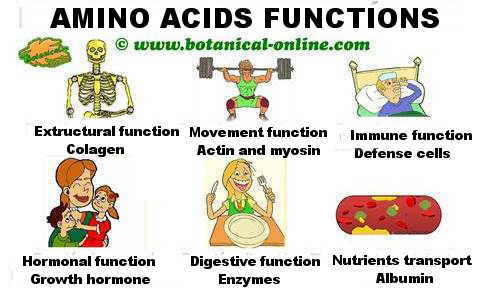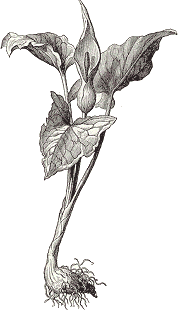Contents
Uses of amino acids
FUNCTIONS ON THE AMINO ACIDS IN THE ORGANISM
Importance of amino acids
Amino acids are essential for proper functioning of our body.
When the body does not get enough proteins (source of amino acids), it uses its reserves (mainly muscle).
You can not imagine a diet without proteins, since, in a long-term, a protein deficiency would be generated, which is one of the most serious types of malnutrition.
Functions of the amino acids in the organism
Amino acids generally perform their functions attached to other amino acids forming peptides (binding few amino acids), polypeptides (binding of several amino acids) or proteins (long chains of amino acids linked together, forming large molecules).
 Summary of the main functions of amino acids in the body. Amino acids generally act together forming peptides or proteins, and they exert different functions.
Summary of the main functions of amino acids in the body. Amino acids generally act together forming peptides or proteins, and they exert different functions.What do amino acids do?
These components exert different functions in the human body, which are all vital:
- Structural function: The skeleton, muscles, skin, and generally all tissues of the body are made up of proteins. One of the most important protein is collagen.
- Motion function: Amino acids make locomotor movement possible through the muscle fibers,. The main fibers are actin and myosin.
- Hormonal function: All hormones are formed by amino acids. These are responsible for regulating all metabolic processes in the body.For example, part of the growth hormone TSH (in charge of regulating thyroid function), sex hormones (responsible for regulating the menstrual cycle or sperm maturation), and even hormones responsible for the alert situations, such as adrenaline.
- Immune function: The immune system is made up of defensive cells, made of proteins. It would not be possible the proper functioning of the immune system without protein: On the one hand, proteins are cells of the immune system, and, moreover, they permit recognition of the cells themselves by means of signaling proteins. Signaling proteins are located in the membranes of every cell as if they were an identity card so that the defensive cells identify them as their own and do not attack the body itself.
- Exchange function: Proteins are part of cell membranes, forming bridges of exchange of substances between one medium and another of the cells.
- Cellular respiration would be impossible without proteins. Similarly, most hormones and substances (such as drugs or nutrients) penetrate inside cells through proteins.
- Transporter function: Albumin is a very abundant protein in the blood. It is responsible for transporting substances and drugs by the body. Another example of carrier protein is hemoglobin, which binds oxygen and carbon hydroxide after allowing breathing.
- Digestive function: The allow the body to absorb food digesting them. Digestive enzymes are proteins. Without them, there can not be nutrition. Therefore, many malnourished children, especially in poor or developing country, are unable to absorb food.
- Circulatory Function: Blood clotting control through proteins such as fibrinogen.
Specific functions of every amino acid
* Related information:
– How to combine vegetable proteins
List of amino acids in food | |
Essential amino acids | Nonessential amino acids |
Phenylalanine, Isoleucine, Leucine, Lysine, Methionine, Threonine, Tryptophan, Valine | Aspartic acid, Glutaminic acid, Alanine, Arginine, Cysteine, Cystine, Glycine, Hydroxyproline, Proline, Serine, Tyrosine |
![]() More information on amino acids.
More information on amino acids.








